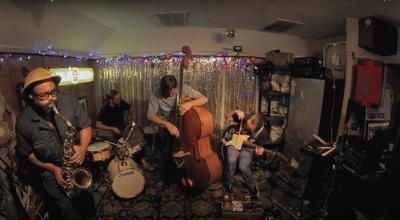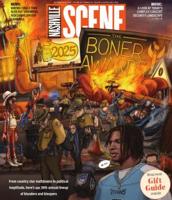
Video still from an In Place performance at Betty's
JayVe Montgomery, John Westberry, Randy Hunt and Scott Mattingly
If you’ve been following experiential and experimental music in Nashville as live shows have made a post-lockdown comeback, you’ve likely heard the name In Place Quartet often. Around the time that the first live performances were happening after months of quarantine isolation, drummer John Westberry, bassist Randy Hunt, reeds and winds player JayVe Montgomery and guitarist Scott Mattingly began to convene as In Place, bringing dive-bar populism to the world of spontaneous music creation that’s so often thought of as heady and academic. The free-jazz crew makes its debut at The Blue Room at Third Man Records on Saturday for a performance that will include group improvisation and solo performance highlights. I caught up with the whole ensemble via Zoom; our interview has been edited for length and clarity.
Tell me a bit about your process and how you guys approach bringing music to the stage.
Scott Mattingly: Each of the four personalities has their own little planet. We hug and then we start to play. And it really reflects where each one of us is on a given day. Sometimes I feel like it’s joyous. Sometimes it’s sorrowful. It can be ecstatic. From one moment to the next, it can change, but it reflects where we are in our musicianship and where we are as people.
JayVe Montgomery: I like to think of this music as like an experiment in emergence theory. The same way birds fly and congregate, each of us takes an emotional direction, the others are there to support those ideas.
SM: I feel like these guys are such great listeners. … Sometimes I’m not playing for a minute, two minutes. I’m just listening to what everyone else is doing, and then I realize, “Oh, here’s something I have to say.” Just like good conversation.
Do you have methodologies or guardrails that you use to start your performance?
JM: I think the only rule I have is, like, that we hear each other — that we play in a way that we can hear each other.
Does that take a lot of practice on your part, to get where you can just show up and listen?
Randy Hunt: When you get together with a group of people, you don’t have to plan out what you’re gonna talk about. And the conversation, it just kind of comes and goes. So that’s an easy way for people who don’t understand this music, or are new to it, to understand what we’re doing.
SM: I feel like there’s a political element to it. So I feel like we’d be missing something if we didn’t talk about how it is [politically] charged. … I think we have similar values. I think we have similar desires, similar strains of interest in what we hope for.
JM: Yeah. I think Scott [is] speaking to the struggle of democracy. We’re talking and listening all at once. That’s what this experiment of democracy is. Like, you have to be able to listen, and you have to be able to give, and support your ideas — and back off of your ideas when they’re bad, when they get in the way of everybody else’s expression.
Did it take time to learn how to ease off?
JM: I think it’s life experience. I remember being in Chicago early on when I was learning the music, and there’s this session on the beach every summer at 63rd Street by the lake. There’s dozens of drummers, percussion players, wind instruments. I was playing my saxophone one day, 15 years ago or so, and this elder came up and he was like, “You know, you don’t have to be louder than everybody.” [Laughs.]
RH: I don’t think we could be successful playing what kind of music we do without a lot of trust in each other. … Listen, and you trust that everybody is gonna commit to what they do and play as a group. In this kind of music, there’s a lot of people who think you can just kind of do whatever you want, whenever you want, and that’s not the way it works.
JM: Yeah. It’s nice to move as one sound, to me that seems like the highest attainment that we can [hope for], you know? ’Cause we’re obviously four different people, but I think the ask is to be a community onstage and present an idea.
What has you excited for the next show and beyond?
JM: I love our live recordings that John documents. I think they really capture the essence of the energy that we’re creating and working with. I’m excited to have a longer set at Third Man so we can start to incorporate longer solos. I play woodwinds through electronics, do my own solo electronics thing — electroacoustic performance. It is gonna be nice to start with that, then have Randy’s sound be highlighted, and be able to stretch out for several hours at Third Man.
SM: I got a guitar with a built-in Kaoss Pad that I’ve been using like a false bridge [for the guitar strings]. … It’s got a real cool droning, sustaining sound. Something I’m really looking forward to using during the solo-sets portion.
John Westberry: I wanna find a way to use these big-ass toms — like, huge. A [20-inch] and 18, a 16 and a 14 that I’ve been practicing like timpani in the house. [Laughs.] I’d love to have those. That doesn’t all come in one cart though, you have to go back to the car to get more shit.








